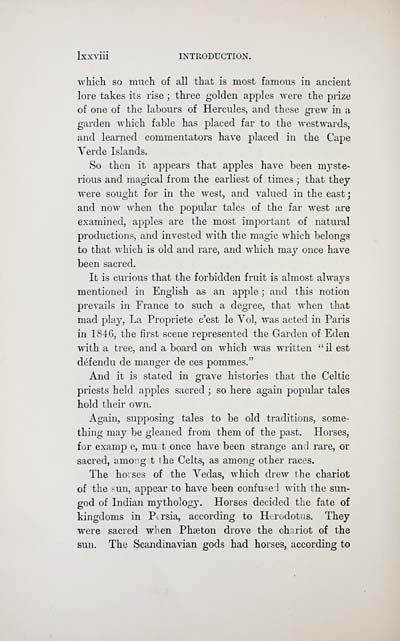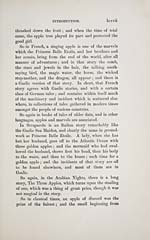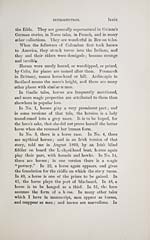Download files
Complete book:
Individual page:
Thumbnail gallery: Grid view | List view

Ixxviii INTRODUCTION.
which so much of all that is most famous in ancient
lore takes its rise ; three golden apples were the prize
of one of the labours of Hercules, and these grew in a
garden which fable has placed far to the westwards,
and learned commentators have placed in the Cape
Verde Islands.
So then it appears that apples have been myste-
rious and magical from the earliest of times ; that they
Avere sought for in the west, and valued in the east ;
and now when the popular tales of the far west are
examined, apples are the most important of natural
productions, and invested with the magic which belongs
to that which is old and rare, and which may once have
been sacred.
It is curious that the forbidden fruit is almost always
mentioned in English as an apple ; and this notion
prevails in France to such a degree, that when that
mad play. La Propriete c'est le Vol, was acted in Paris
in 1846, the first scene represented the Garden of Eden
with a tree, and a board on which Avas written " il est
dèfendu de manger de ces pommes."
And it is stated in grave histories that the Celtic
priests held apples sacred ; so here again popular tales
hold their own.
Again, supposing tales to be old traditions, some-
thing may be gleaned from them of the past. Horses,
for examp e, mu t once have been strange and rare, or
sacred, among t the Celts, as among other races.
The horses of the Vedas, which drew the chariot
of the ^nn, appear to have been confuse 1 with the sun-
god of Indian mythology. Horses decided the fate of
kingdoms in Persia, according to HLrodotus. They
were sacred wlien Phseton drove the chiriot of the
sun. The Scandinavian gods had horses, according to
which so much of all that is most famous in ancient
lore takes its rise ; three golden apples were the prize
of one of the labours of Hercules, and these grew in a
garden which fable has placed far to the westwards,
and learned commentators have placed in the Cape
Verde Islands.
So then it appears that apples have been myste-
rious and magical from the earliest of times ; that they
Avere sought for in the west, and valued in the east ;
and now when the popular tales of the far west are
examined, apples are the most important of natural
productions, and invested with the magic which belongs
to that which is old and rare, and which may once have
been sacred.
It is curious that the forbidden fruit is almost always
mentioned in English as an apple ; and this notion
prevails in France to such a degree, that when that
mad play. La Propriete c'est le Vol, was acted in Paris
in 1846, the first scene represented the Garden of Eden
with a tree, and a board on which Avas written " il est
dèfendu de manger de ces pommes."
And it is stated in grave histories that the Celtic
priests held apples sacred ; so here again popular tales
hold their own.
Again, supposing tales to be old traditions, some-
thing may be gleaned from them of the past. Horses,
for examp e, mu t once have been strange and rare, or
sacred, among t the Celts, as among other races.
The horses of the Vedas, which drew the chariot
of the ^nn, appear to have been confuse 1 with the sun-
god of Indian mythology. Horses decided the fate of
kingdoms in Persia, according to HLrodotus. They
were sacred wlien Phseton drove the chiriot of the
sun. The Scandinavian gods had horses, according to
Set display mode to: Large image | Transcription
Images and transcriptions on this page, including medium image downloads, may be used under the Creative Commons Attribution 4.0 International Licence unless otherwise stated. ![]()
| Early Gaelic Book Collections > Matheson Collection > Popular tales of the west Highlands > Volume 1 > (98) |
|---|
| Permanent URL | https://digital.nls.uk/81388404 |
|---|
| Description | Volume I. |
|---|---|
| Shelfmark | Mat.74 |
| Additional NLS resources: | |
| Attribution and copyright: |
|
| Description | Items from a collection of 170 volumes relating to Gaelic matters. Mainly philological works in the Celtic and some non-Celtic languages. Some books extensively annotated by Angus Matheson, the first Professor of Celtic at Glasgow University. |
|---|
| Description | Selected items from five 'Special and Named Printed Collections'. Includes books in Gaelic and other Celtic languages, works about the Gaels, their languages, literature, culture and history. |
|---|

